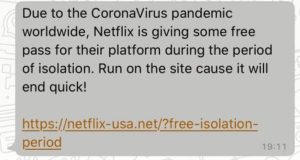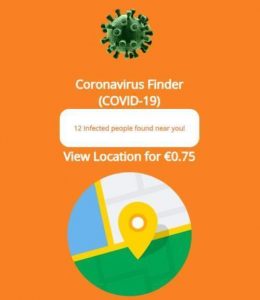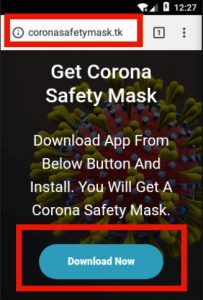What national emergency would be complete without scam artists taking advantage of the vulnerable? Community health experts are telling us that older patients are more vulnerable to the COVID-19 virus than other age cohorts, but older citizens also are the disproportionate targets of a number of new on-line scams. If you have an older loved one, help them to beware of these new scams that are on the rise:
We all are aware of “software viruses.” COVID-19 can attack your loved one’s computer, or so some scammers would have people believe. I know it seems ludicrous, but unsuspecting people have been invited to a site where they can download free anti-Corona virus protection for their computers. The victims are invited to download the “free app” which immediately infects their computer and enslaves it as a bot for the scammer’s use.
In another false offer, scammers are offering free subscriptions to Netflix for people trying to maintain their social distance and their sanity. In addition to asking “subscribers” to answer some questions, the offer also asks them to share this premium offer with ten of their friends. This latter is their way to gain even more prey and their personal information for their trap.
For those who are fearful of the contagion near them, there also is a scam that promises to share with them the number of COVID-19 infected people geographically near them…for a fee. It’s not some sort of “neighborhood” app. This one is just a hoax to gain access to the prey’s credit card information.
In a pandemic with a huge shortage of personal protective equipment, scammers offer an app that not only will ultimately lead the victim to give up their credit card information for the modestly-priced safety gear, but also surrender access to their contacts list.
In another scam, individuals are forwarded what appears to be a text message for how they can secure the “stimulus check” that has been promised by the federal government. The threat that they may not receive their check without completing the form frightens victims into compliance.
Finally, there is another scam in which victims are accused of breaking quarantine in their locales. And there is a fine associated with this crime, but to maintain quarantine, the accused can simply pay their fines on line…with a credit card, of course.
quarantine in their locales. And there is a fine associated with this crime, but to maintain quarantine, the accused can simply pay their fines on line…with a credit card, of course.
We at CCM want you all to remain safe and follow the rules so that you all will get through this health crisis. We also encourage you to help the more vulnerable on-line users to stay safe from criminals who take advantage of the fears that such a crisis can evoke. Be safe and be healthy.
Charlotte Bishop is an Aging Life Care Advisor, Geriatric Care Manager and founder of Creative Care Management, certified professionals who are geriatric advocates, resources, counselors and friends to older adults and their families in metropolitan Chicago. She also is the co-author of How Do I Know You? A Caregiver’s Lifesaver for Dealing with Dementia.











